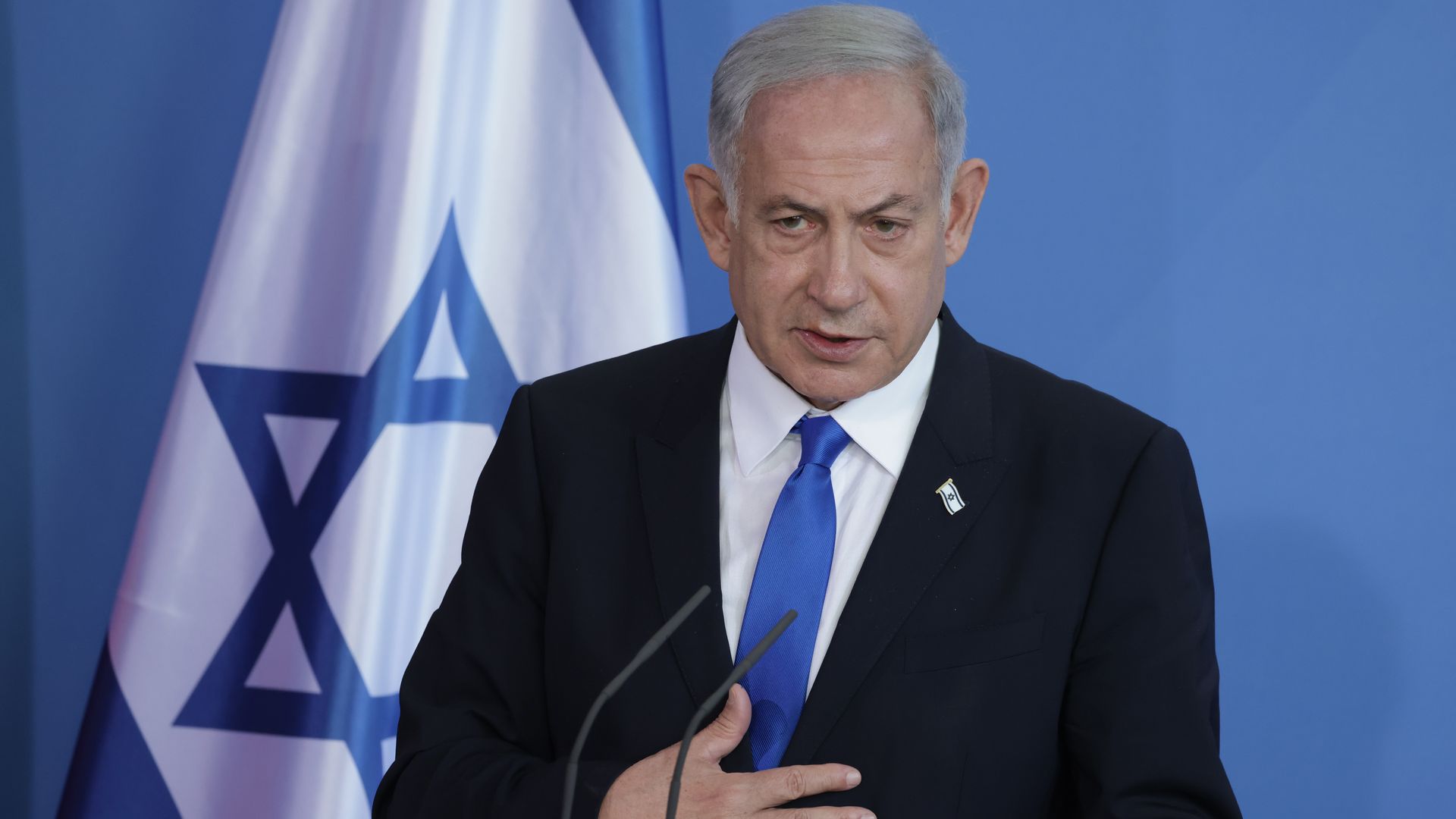Netanyahu doubles down on judicial overhaul plan
Israeli Prime Minister Benjamin Netanyahu. Photo: Sean Gallup/Getty Images
Israeli Prime Minister Benjamin Netanyahu announced on Thursday that he will not suspend his judicial overhaul plan, despite mass nationwide demonstrations and unprecedented warnings from the leaders of the military and security services who say protests among reservists could impact the IDF's operational preparedness and capabilities.
Why it matters: Netanyahu's speech signals he has no intention of accepting any compromise on the key elements of the plan and that he is totally aligned with the most extremist ministers in his government. He said one of those key elements — a law that will give his coalition an automatic majority on the panel that appoints Supreme Court judges — will be put to a vote in the Knesset next week.
Driving the news: Netanyahu gave his speech at the end of the most dramatic day of protests and political infighting since Justice Minister Yariv Levin presented the plan in early January.
- Tens of thousands of Israelis on Thursday rallied across the country against the government and the overhaul plan. Protesters blocked some of Israel's main highways for several hours.
- Israeli media reported Thursday evening that Defense Minister Yoav Gallant was preparing to give a dramatic statement during the primetime news hour to call on Netanyahu to immediately suspend the legislation in order to stop protests among IDF reservists.
- Netanyahu then announced that he was giving a speech of his own and summoned Gallant for an urgent meeting to try and reassure him and convince him to cancel his planned statement.
Behind the scenes: Gallant warned Netanyahu in their meeting that moving forward with the judicial overhaul could lead to more protests among IDF reservists and even inside the regular army, an aide to the minister of defense told Axios.
- The meeting with Gallant came after Netanyahu received similar warnings from the IDF Chief of Staff Herzi Halevi, as well the director of the Shin Bet domestic security agency.
What they're saying: Despite forging ahead with the plan, Netanyahu did show some empathy toward protesters and those who are concerned about the negative consequences of the legislation.
- “We have to do all we can to protect our country from external threats and from an unrepairable internal rift," he said. "Those who oppose the reform are not traitors and those who are in favor of it are not fascists."
- Netanyahu said he wants to promote a reform that will restore the balance between the different branches of power but will protect civil liberties. “We didn’t come to run over anybody. We came to fix and balance," he said.
- Netanyahu said he wants a dialogue with the opposition and is attentive to the concerns of those who oppose his plan.
- “In all democracies including the U.S. elected officials pick the judges. Is the U.S. not a democracy? If this reform passes it will not be the end of democracy, it will be a strengthening of democracy," Netanyahu argued.
- Yes, but: Netanyahu’s comparison to the U.S. ignored the significant differences in the systems of government between the two countries and the fact that the U.S. has more checks and balances than Israel.
Catch up quick: According to the coalition plan, six of the 11 members on the committee that appoints judges to the Supreme Court will be from the ruling coalition, giving the government full control over the process.
- The coalition will be able to appoint the next two Supreme Court judges and the new president of the high court by a simple majority in the committee, the plan states.
- If implemented, it will be the first time since the committee was formed in 1953 that Supreme Court judges will be appointed by only politicians from the governing coalition.
Between the lines: Netanyahu is pushing the legislation through while standing trial for bribery, fraud and breach of trust. He denies any wrongdoing.
- If the government fully controls the appointment of Supreme Court judges, Netanyahu will be able to influence the formation of the panel that could discuss his appeal.
What to watch: Netanyahu said his coalition is still planning to push through a law that will enable the Knesset to override Supreme Court rulings, he but stressed the legislation will not include the ability to do so with a simple 61 members majority in the parliament.
- He also said that the coalition will pass a law that includes the protection of basic civil and human rights for all the citizens of Israel. “Every legislation will have to be based on these principles. I will personally make sure this is the case," Netanyahu said.
The other side: Opposition leader Yair Lapid and former Defense Minister Benny Gantz rejected Netanyahu’s speech and accused the prime minister of harming Israel’s democracy and hampering Israel’s security.
- The civil society organizations that lead the protests against the judicial overhaul also rejected the speech and said the demonstrations will continue on Saturday night.
Go deeper: U.S. Dem lawmakers hold "emotional" meeting with Israeli ambassador over judicial overhaul
Source: Read Full Article



